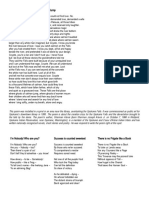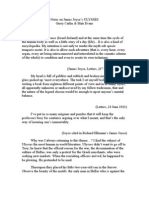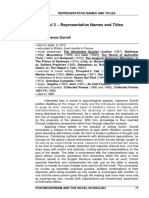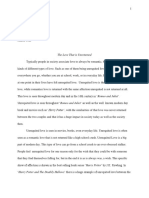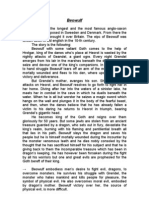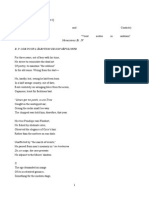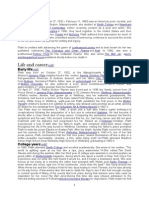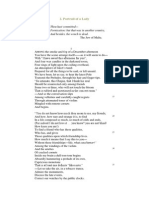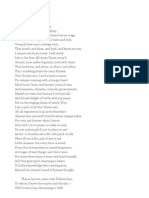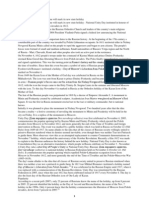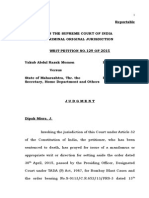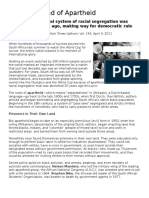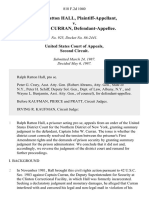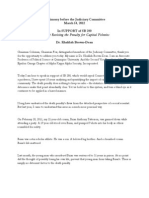Exeat
Exeat
Uploaded by
ryaiaCopyright:
Available Formats
Exeat
Exeat
Uploaded by
ryaiaOriginal Description:
Copyright
Available Formats
Share this document
Did you find this document useful?
Is this content inappropriate?
Copyright:
Available Formats
Exeat
Exeat
Uploaded by
ryaiaCopyright:
Available Formats
Exeat
Stevie Smith
I remember the Roman Emperor, one of the cruellest of them,
Who used to visit for pleasure his poor prisoners cramped in dungeons,
So then they would beg him for death, and then he would say:
Oh no, oh no, we are not yet friends enough.
He meant they were not yet friends enough for him to give them death.
So I fancy my Muse says, when I wish to die:
Oh no, Oh no, we are not yet friends enough,
And Virtue also says:
We are not yet friends enough.
How can a poet commit suicide
When he is still not listening properly to his Muse,
Or a lover of Virtue when
He is always putting her off until tomorrow?
Yet a time may come when a poet or any person
Having a long life behind him, pleasure and sorrow,
But feeble now and expensive to his country
And on the point of no longer being able to make a decision
May fancy Life comes to him with love and says:
We are friends enough now for me to give you death;
Then he may commit suicide, then
He may go.
Exeat Themes
Themes and Meanings (Critical Guide to Poetry for Students)
print Print
document PDF
list Cite
link Link
According to her biographer, Smith first thought of suicide at the age of eight when she was
confined to a hospital, and the power consciously to choose death over life is a common
theme in her poetry. Exeat explicitly confronts two elements of this theme: First, the
desirability of death, and second, the conditions under which suicide can be a rational and
moral choice.
The conditions of life that might lead a poet, or anyone else, to desire death appear both
directly and implicitly in this poem. The opening story of the Roman emperor and his
prisoners invites one to see the speaker of the poem and oneself as captives of a cruel ruler,
forced to remain in dungeons because that ruler will not permit dying. The speaker, like the
prisoners, might beg for death as the one thing most desired. The prison most feared by
the speaker of this poem, however, is not a literal dungeon but rather the prospect of being
feeble now and expensive to his country/ And on the point of no longer being able to make a
decision.
To earn the chance to escape the prison (whether literal or metaphorical), the speaker asserts,
one must live virtuously and produce good work; to commit suicide without meeting those
conditions is impossible. Thus, the human being must keep working and keep trying to be
good, even though he or she is at best a chained captive longing for death as a release.
Having met the conditions of Having a long...
Observing the above stanzas the narrator laments the waiting game of death and give reasons
as to why death should welcome the person or poet into its arms. The poem is straight-forward
enough, with one exception: the continuous question of whenwhen are we acquainted enough
with death to receive its invitation (or to allow it in)?
With the exception of Smiths autobiographical A House of Mercy, Exeat is one of the saddest
poems in her repertoire. In my opinion, it is not a typical sadness, because one of Smiths
strongest gifts is her humor whether it be subtle or overt. If she were alive and still writing today,
she might pen black comedies. This poem has a modern movie essence about it, because it
discusses death (and subsequently, suicide) in ways that buck tradition and maintains that death
is a privilege to attain. It is a statement: on the finality and bliss of death, on suicide and on our
relationship with death and how we covet it whether in good terms or bad.
First published in 1966, three years after the death of Sylvia Plath, I wonder if Exeat (Latin for let
him/her go out) contains another answer to the poets untimely end. According to some scholars,
Plath was a enthusiastic admirer of Smith. It is written that she sought a meeting with Smith but
her death curtailed it. Reading this poem, I wonder how much Plath was on Smiths mind as she
wrote; I wonder if, this was another way for her to attend that meeting they never had, to show
acceptance for the act, to say farewell and maybe express envy for Plaths self-inflicted goodbye.
Stevie Smith was born as Florence Margaret Smith on September 20, 1902 in Yorkshire, England.
Her nick named was Peggy until her middle twenties. Her writers name was given to her by a
friend that said that Florence reminded her of the jockey Steve Donaghue. Stevie Smith lived
through both World Wars. She died when she was 68 years old from a brain tumor.
Forty years after her death, her works are still a mystery.How a dull secretary could "create such a
provocative, vividly unique body of work."(British Writers). Her works of poetry contain hints of
humor with disconcerting seriousness. Stevie Smiths poetry best fit under the confessional
poetry movement in the English modern period. However her poetry is unlike that of her
contemporaries, Wright observed One reason may be not only does she belong to no
schoolwhether real or invented as they usually arebut her work is so completely
different from anyone elses Smith never attended a university. Ashamed of her lack
of education, she took notes of every book that she read. Her readings ranged from
history to literary criticism. The only area she did not read was contemporary poetry.
Her best known poem would be "Not Waving but Drowning". This poem not only influenced
poetics but photographers as well. The picture at the right was taken by Robert Fibunder the
influence of "Not Waving but Drowning".This poem is a example of black humor. The man in
this poem has drowned in the sea ironically while his friends believe that he was waving to them.
There are three speakers in this poem: a narrator, the crowd, and the drowned man. The drowned
mans words state of his isolation from them, and his desperation in his trying to get help from
them. The crowd tells us of the drowned mans life as they know it, full of merriment. They
believe that he got too cold in the water which caused his heart to give way. The drowned man
replies that it was cold always, and he was much further out all of his life.
"Not Waving but Drowning"
Nobody heard him, the dead man,
But still he lay moaning:
I was much further out than you thought
And not waving but drowning.
Poor chap, he always loved larking
And now he's dead
It must have been too cold for him his heart gave way,
They said.
Oh, no no no, it was too cold always
(Still the dead one lay moaning)
I was much too far out all my life
And not waving but drowning.
The last lines of the poem state the theme by "Oh, no no no, it was too cold always/(Still the dead
one lay moaning)/I was much too far out all my life/ And not waving but drowning."(Smith 9-12)
The man in his poem appears to be a joyful jolly man, but inside he is drowning in his own
pretence. He never tells them of his sadness and his feeling of alienation. He fells that the world is
too cold to him and he does not belong. His fries of fitting in by pretending to be what he expects
everyone else wants him to be, but in the end fails. When he knows that he needs help in the end,
his pretending of being someone else backfires; the people in his life misread his desperate
signals. In this poem only the last stanza is the word "he" or "man" omitted, and in its' place is
"one". This omission to the poem gives the reader a clue that this poem is not just about a man
drowning, but can be applied to everyone that feels that they are alone in the world.
Another example of her unique poetry style is "Exeat". A sadistic use of the term friendship is
used in this poem. Both poem examine the negative aspects of friendship. A example of an use of
dramtic wording that is also comically is "Oh no, oh no, we are not yet friend enough."
"Exeat"
I remember the Roman Emperor, one of the cruelest of them,
Who used to visit for pleasure his poor prisoners cramped in dungeons,
So then they would beg him for death, and then he would say:
Oh no, oh no, we are not yet friends enough.
He meant they were not yet friends enough for him to give them death.
So I fancy my Muse says, when I wish to die:
Oh no, Oh no, we are not yet friends enough,
And Virtue also says:
We are not yet friends enough.
How can a poet commit suicide
When he is still not listening properly to his Muse,
Or a lover of Virtue when He is always putting her off until tomorrow?
Yet a time may come when a poet or any person
Having a long life behind him, pleasure and sorrow,
But feeble now and expensive to his country
And on the point of no longer being able to make a decision
May fancy Life comes to him with love and says:
We are friends enough now for me to give you death;
Then he may commit suicide, then
He may go.
Stevie Smith influence many people. After her dealth, her life has been made into two
full-length biographies as well as a play. The play was latter adapted into a popular film
named "Stevie" starring Glenda Jackson made in 1978. Her works continued to influence
literature and art long after her dealth.
You might also like
- Ross Ulbricht SentencingDocument98 pagesRoss Ulbricht SentencingMotherboardTV100% (4)
- That Place Where Ghosts of Salmon JumpDocument2 pagesThat Place Where Ghosts of Salmon Jumpasmpjuly2004No ratings yet
- Douglass Theme EssayDocument1 pageDouglass Theme Essayapi-412692077No ratings yet
- Fowles vs. DickensDocument4 pagesFowles vs. Dickensboier_motocNo ratings yet
- Symbolism of Colours - Moby DickDocument2 pagesSymbolism of Colours - Moby DickCristina-Raluca RuşeţNo ratings yet
- F.E. Campbell - Fetters Are Forever - HIT 180Document160 pagesF.E. Campbell - Fetters Are Forever - HIT 180HokusLocus63% (8)
- Comedia Existentei La D. R. PopescuDocument150 pagesComedia Existentei La D. R. PopescukarinushuNo ratings yet
- Woolf - Referat Forma FinalaDocument11 pagesWoolf - Referat Forma FinalaConny DorobantuNo ratings yet
- POEMS Eliot, TS Sweeney Among The Nightingales (1918) Analysis by 2 CriticsDocument2 pagesPOEMS Eliot, TS Sweeney Among The Nightingales (1918) Analysis by 2 CriticsAnjanNo ratings yet
- Paradoxism After ParadoxismDocument13 pagesParadoxism After ParadoxismMia AmaliaNo ratings yet
- Silas MarnerDocument4 pagesSilas Marnerthatoneginger1775% (4)
- Micromegas and Other Short Fictions (Voltaire) (Z-Library)Document213 pagesMicromegas and Other Short Fictions (Voltaire) (Z-Library)Shota KakauridzeNo ratings yet
- Peer GyntDocument3 pagesPeer GyntSebi NagyNo ratings yet
- Novel 1: - English Studies - S5P1 - Number of The Module (M27) - Professor: Mohamed RakiiDocument9 pagesNovel 1: - English Studies - S5P1 - Number of The Module (M27) - Professor: Mohamed RakiiKai Kokoro100% (1)
- Jeong Hwan-Kim - Scurtă Introducere A Suprarealismului. Coreea Şi Lumea Literară A Suprarealistului Împăiat, Yi SangDocument8 pagesJeong Hwan-Kim - Scurtă Introducere A Suprarealismului. Coreea Şi Lumea Literară A Suprarealistului Împăiat, Yi SangCarlosAmadorFonsecaNo ratings yet
- 33 A DobrinescuDocument8 pages33 A DobrinescuCecilia Trandafir100% (1)
- Mircea Nedelciu Si Tratamentul Fabulator PDFDocument21 pagesMircea Nedelciu Si Tratamentul Fabulator PDFileanabbc_422485993No ratings yet
- Wuthering Heights and The GothicDocument24 pagesWuthering Heights and The Gothicapi-301037423No ratings yet
- Notes On James JoyceDocument55 pagesNotes On James JoyceBen Threlkeld LoganNo ratings yet
- In RasparDocument119 pagesIn RasparAnonymous ayEMRq2TL8No ratings yet
- As I Lay Dying%Document21 pagesAs I Lay Dying%fadwaNo ratings yet
- Wuthering HeightsDocument283 pagesWuthering HeightsgiovannieduardoNo ratings yet
- Erich Auerbach, Mimesis (Cap. Cicatricea Lui Ulise) PDFDocument15 pagesErich Auerbach, Mimesis (Cap. Cicatricea Lui Ulise) PDFDraghici AurelianNo ratings yet
- Containing Childhood: Space and Identity in Children’s LiteratureFrom EverandContaining Childhood: Space and Identity in Children’s LiteratureDanielle RussellNo ratings yet
- 01 Laura Zavaleanu The Topochrony of Books From The Folk The Heraldry of LoveDocument6 pages01 Laura Zavaleanu The Topochrony of Books From The Folk The Heraldry of LoveOana BaraianNo ratings yet
- Representatives of PostmodernismDocument24 pagesRepresentatives of PostmodernismMarie StoieNo ratings yet
- Unrequited Love EssayDocument6 pagesUnrequited Love Essayapi-410544557No ratings yet
- Noua Critica Franceza Si RomaniaDocument6 pagesNoua Critica Franceza Si RomaniaMircea ZarifopolNo ratings yet
- D - H - LawrenceDocument12 pagesD - H - LawrenceGabriela RînjeaNo ratings yet
- Yeats Image and Idea in Yeats Second ComingDocument13 pagesYeats Image and Idea in Yeats Second Comingye3st4er5No ratings yet
- Shakespeare Pericles Prince of TyreDocument18 pagesShakespeare Pericles Prince of Tyrecultural_mobilityNo ratings yet
- Man of CrowdDocument11 pagesMan of CrowdzainabNo ratings yet
- Writer's Notebook - Dan LunguDocument4 pagesWriter's Notebook - Dan LunguDan Lungu100% (1)
- Paul Hazard - Gandirea Europeana in Sec 18 - FragmenteDocument14 pagesPaul Hazard - Gandirea Europeana in Sec 18 - FragmentemoOnykNo ratings yet
- Study Guide BA 2014 15 PDFDocument140 pagesStudy Guide BA 2014 15 PDFDenisa DamianNo ratings yet
- Romantic Reinventions in D. H. Lawrence's Women in LoveDocument6 pagesRomantic Reinventions in D. H. Lawrence's Women in LoveMelissaCasconeNo ratings yet
- Changing PlacesDocument1 pageChanging PlacesM2723No ratings yet
- Teacher's Guide: LUKA AND THE FIRE OF LIFE by Salman RushdieDocument8 pagesTeacher's Guide: LUKA AND THE FIRE OF LIFE by Salman RushdieRandomHouseAcademicNo ratings yet
- 09Document12 pages09MehadiNo ratings yet
- Nichita Stanescu in EnglezaDocument28 pagesNichita Stanescu in EnglezaEmanuelaCiocanNo ratings yet
- Seminar 9 Conversational MaximsDocument4 pagesSeminar 9 Conversational MaximsVicol AncutaNo ratings yet
- Book Review 2 - Utopia - Zamfir Carina AndreeaDocument2 pagesBook Review 2 - Utopia - Zamfir Carina AndreeaCarina A. ZamfirNo ratings yet
- Comentariu La BeowulfDocument3 pagesComentariu La BeowulfAdrianZestreaNo ratings yet
- Campus Novel NewDocument21 pagesCampus Novel NewVidyut RoyNo ratings yet
- Absalom, Absalom! Is Considered To Be One of Faulkner's Most Difficult Novels Because ofDocument3 pagesAbsalom, Absalom! Is Considered To Be One of Faulkner's Most Difficult Novels Because ofGeanina PopescuNo ratings yet
- Rene WellekDocument2 pagesRene Wellekmohandas76No ratings yet
- Jewish American Literature - 97Document3 pagesJewish American Literature - 97slnkoNo ratings yet
- Romanticism and Modernism in Rilke'sDocument8 pagesRomanticism and Modernism in Rilke'sMarcello AccettaNo ratings yet
- 5 - Semantics and LogicDocument2 pages5 - Semantics and LogicgabrielaNo ratings yet
- Romanian Authors On The French TerritoryDocument5 pagesRomanian Authors On The French TerritoryMircea MeriacriNo ratings yet
- Literary Analysis - Catch-22Document12 pagesLiterary Analysis - Catch-22api-249866811No ratings yet
- Subiecte - LEC, An 1 Sem.2Document8 pagesSubiecte - LEC, An 1 Sem.2Iulia OnofreiNo ratings yet
- Artistic and Literary Places in France As Tourist AttractionsDocument9 pagesArtistic and Literary Places in France As Tourist AttractionsAdinda Marsha AnugrahNo ratings yet
- A Translation of Der Blonde Eckbert-2.14.14Document14 pagesA Translation of Der Blonde Eckbert-2.14.14Ela Dragotă100% (2)
- The Destructiveness of A Love That Never ChangesDocument5 pagesThe Destructiveness of A Love That Never ChangesDzul Azraai Dzulkarnain100% (1)
- Keats - Ode To A Grecian UrnDocument1 pageKeats - Ode To A Grecian UrnAndrei GalbenuNo ratings yet
- PraislerDocument8 pagesPraislerCarmen Maria Fluturaş100% (1)
- Forms Poetry PresentationDocument3 pagesForms Poetry PresentationAJZNo ratings yet
- Hamlet BibliographyDocument4 pagesHamlet BibliographyphthysyllysmNo ratings yet
- Hugh Swelwyn MaulberlyDocument29 pagesHugh Swelwyn MaulberlyryaiaNo ratings yet
- The Purloined Letter (Text)Document13 pagesThe Purloined Letter (Text)ryaiaNo ratings yet
- Was He Married?: Stevie SmithDocument5 pagesWas He Married?: Stevie SmithryaiaNo ratings yet
- Sylvia PlathDocument12 pagesSylvia PlathryaiaNo ratings yet
- Gertrude SteinDocument11 pagesGertrude SteinryaiaNo ratings yet
- Early Life: Writing CareerDocument7 pagesEarly Life: Writing CareerryaiaNo ratings yet
- Poetry in GeneralDocument5 pagesPoetry in GeneralryaiaNo ratings yet
- Ezra PoundDocument21 pagesEzra PoundryaiaNo ratings yet
- Altarwise by Owl LightDocument4 pagesAltarwise by Owl LightryaiaNo ratings yet
- Portrait of A Lady (Integral)Document3 pagesPortrait of A Lady (Integral)ryaiaNo ratings yet
- Not Waving But DrowningDocument8 pagesNot Waving But DrowningryaiaNo ratings yet
- The Affective Fallacy PDFDocument14 pagesThe Affective Fallacy PDFryaiaNo ratings yet
- Sonnets From The PortugueseDocument27 pagesSonnets From The PortugueseryaiaNo ratings yet
- UlyssesDocument7 pagesUlyssesryaiaNo ratings yet
- Prospice (Integral)Document1 pageProspice (Integral)ryaiaNo ratings yet
- A Note On Defamiliarization: The Purpose of DefamiliarizationDocument0 pagesA Note On Defamiliarization: The Purpose of DefamiliarizationryaiaNo ratings yet
- Info Algernon Charles SwinburneDocument5 pagesInfo Algernon Charles SwinburneryaiaNo ratings yet
- My Last Duchess (Integral)Document2 pagesMy Last Duchess (Integral)ryaiaNo ratings yet
- In Harmony With Nature (Integral)Document1 pageIn Harmony With Nature (Integral)ryaiaNo ratings yet
- Neutral Tones (Integral) by Thomas HardyDocument1 pageNeutral Tones (Integral) by Thomas HardyryaiaNo ratings yet
- Crossing The Bar by Alfred TennysonDocument1 pageCrossing The Bar by Alfred TennysonryaiaNo ratings yet
- Reformele Lui Petru Cel Mare Si Ziua RusieiDocument10 pagesReformele Lui Petru Cel Mare Si Ziua RusieiryaiaNo ratings yet
- Conjunction 1Document7 pagesConjunction 1Rohit ChaudharyNo ratings yet
- Penology and Victimology-5th SemDocument22 pagesPenology and Victimology-5th SemPRATEEK AUSTIN100% (1)
- United States: Created By: Miron LuminitaDocument25 pagesUnited States: Created By: Miron LuminitaLuminiţaMironNo ratings yet
- Lost Girl (Lost Girl Series Book 1)Document18 pagesLost Girl (Lost Girl Series Book 1)Liz DavisNo ratings yet
- Crim 2 ReviewerDocument100 pagesCrim 2 Reviewerpanderbeer100% (1)
- Imagine Shifted House: Usage - He Abetted Him in Stealing A BatDocument28 pagesImagine Shifted House: Usage - He Abetted Him in Stealing A BatSohil Bakshi100% (1)
- Reodica vs. CADocument1 pageReodica vs. CAPMV100% (1)
- Port Operations and Management: Dr. Funda Yercan, ProfessorDocument24 pagesPort Operations and Management: Dr. Funda Yercan, ProfessorCagatay alpNo ratings yet
- Espineli v. PeopleDocument6 pagesEspineli v. PeopleAngelicaAldayMacasadia0% (1)
- United States v. Adolphus Hohensee, An Individual, Scientific Living, Inc., A Corporation, El Rancho Adolphus Products, Inc., A Corporation, 251 F.2d 147, 3rd Cir. (1957)Document2 pagesUnited States v. Adolphus Hohensee, An Individual, Scientific Living, Inc., A Corporation, El Rancho Adolphus Products, Inc., A Corporation, 251 F.2d 147, 3rd Cir. (1957)Scribd Government DocsNo ratings yet
- Pakistan The Prisons Act 1894Document19 pagesPakistan The Prisons Act 1894Muhammad Shahbaz TahirNo ratings yet
- Jerad Gourdin Charging DocumentsDocument4 pagesJerad Gourdin Charging DocumentsAlyssa RobertsNo ratings yet
- Introduction To Game Theory/Prisoner's DilemmaDocument2 pagesIntroduction To Game Theory/Prisoner's DilemmaSean ChoNo ratings yet
- Yakub Memon JudgmentDocument31 pagesYakub Memon JudgmentLive Law100% (2)
- Charges Detail Cop's Drug Cover, One Suspect AlsoDocument3 pagesCharges Detail Cop's Drug Cover, One Suspect AlsoKareema SmithNo ratings yet
- State Records Retention Schedule For Public SafetyDocument73 pagesState Records Retention Schedule For Public SafetymhashimotoNo ratings yet
- JR Scholastic End of Apartheid ShortDocument3 pagesJR Scholastic End of Apartheid Shortapi-283936557No ratings yet
- Ralph Ratton Hall v. Captain Curran, 818 F.2d 1040, 2d Cir. (1987)Document9 pagesRalph Ratton Hall v. Captain Curran, 818 F.2d 1040, 2d Cir. (1987)Scribd Government DocsNo ratings yet
- ICE Field ManualDocument629 pagesICE Field ManualChris ChiangNo ratings yet
- United States v. Bates, 4th Cir. (2010)Document4 pagesUnited States v. Bates, 4th Cir. (2010)Scribd Government DocsNo ratings yet
- 2012SB280 Khalilah Brown-Dean TestimonyDocument2 pages2012SB280 Khalilah Brown-Dean TestimonyAngi Carter, Ed StannardNo ratings yet
- SnowpiercerDocument4 pagesSnowpiercerchekka.srinu1No ratings yet
- Grammar Videos: Conditionals: Remember To Watch The Video First! Then Read TheDocument2 pagesGrammar Videos: Conditionals: Remember To Watch The Video First! Then Read The0000mdgNo ratings yet
- United States v. Perez Santana, 25 F.3d 1037, 1st Cir. (1994)Document4 pagesUnited States v. Perez Santana, 25 F.3d 1037, 1st Cir. (1994)Scribd Government DocsNo ratings yet
- Timeline of The French RevolutionDocument2 pagesTimeline of The French RevolutionTyler PetersenNo ratings yet
- Wesley Carroll v. Jeffrey Manning, 3rd Cir. (2011)Document4 pagesWesley Carroll v. Jeffrey Manning, 3rd Cir. (2011)Scribd Government DocsNo ratings yet
- Dhananjay ReportDocument28 pagesDhananjay ReportManojitDebroyNo ratings yet
- Wong Yeung NG V Secretary For JusticeDocument3 pagesWong Yeung NG V Secretary For JusticeThomas Ranco SuNo ratings yet

